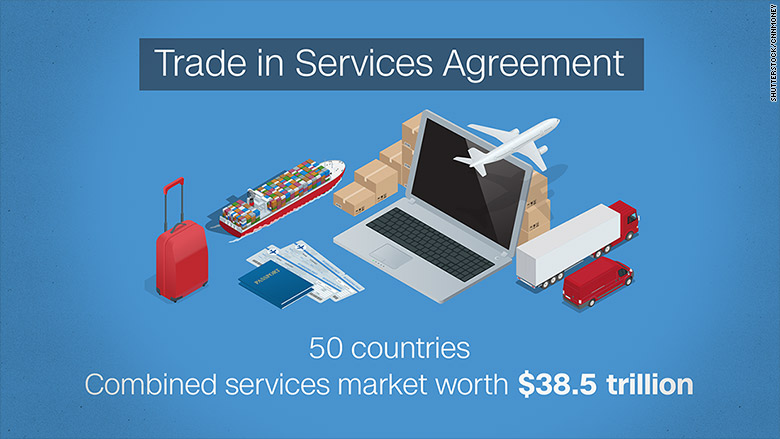
The U.S. is negotiating a trade deal that's worth $38.5 trillion and spans 50 countries -- and most people have never heard about it.
The Trade in Services Agreement (TiSA) has been in the works since April 2013 and it could soon become America's most important trade deal.
That's because services -- everything from tourism, to communication and finance -- are increasingly important for the U.S. economy. They account for three quarters of the GDP and four out of every five jobs in the U.S., according to official statistics.
Unlike in its trade of goods, the U.S. has a big surplus in services trade, meaning it exports a lot more than it imports. This surplus reached $262 billion in 2015.
The Office of the United States Trade representative said the 50 nations deal could help create more jobs and make the U.S. richer.
The group of countries pushing for the deal is calling itself "Really Good Friends of Services." It includes all EU member states, the U.S., Australia, Canada, Mexico, Turkey, Korea, Japan and 15 other countries, more than any other international trade deal.
They represent nearly 70% of the world's $55 trillion services market, the trade department said.

Top German official: EU-U.S. free trade talks have failed
But like the better known Trans-Pacific Partnership (TPP) which has become a flashpoint in the U.S., TiSA is facing a lot of opposition. The agreement is negotiated in secret. That's not unusual for big trade deals, but it is making some people very angry. WikiLeaks has released a series of secret TiSA documents, including a latest batch on Thursday.
Global Justice Now, a campaign group opposing the deal, said it poses a threat to Europe's public services like health care and education, because it opens door to their privatization.
Officials negotiating the deal said public services would be protected from privatization.
Related: Trade troubles haunt G20 leaders at China summit
The U.S. has two other big trade deals in the works. And both look increasingly unlikely to be done before the end of President Obama's term.
The big TPP deal with 11 mostly Asian nations was signed in February, but still needs to be ratified by all the countries involved. It appears unlikely Obama will be able to get it through Congress before he leaves office.
The U.S. is also still pushing for the Transatlantic Trade and Investment Partnership (TTIP) with Europe. The deal is worth $34.2 trillion and has been in the works for more than three years.
But it appears to be stalling. A top German official said the talks were "de facto dead" and France has called for them to be halted.
There is also a huge public opposition against this deal in Europe. Labor unions and pressure groups say the deal would give too much power to big U.S. corporations.
